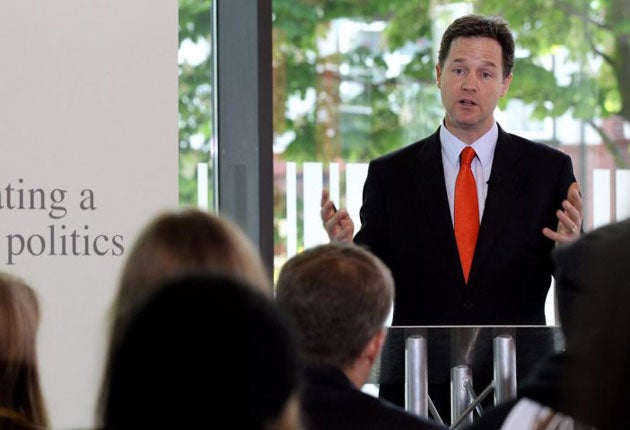Coalition under new strain over human rights u-turn

Your support helps us to tell the story
From reproductive rights to climate change to Big Tech, The Independent is on the ground when the story is developing. Whether it's investigating the financials of Elon Musk's pro-Trump PAC or producing our latest documentary, 'The A Word', which shines a light on the American women fighting for reproductive rights, we know how important it is to parse out the facts from the messaging.
At such a critical moment in US history, we need reporters on the ground. Your donation allows us to keep sending journalists to speak to both sides of the story.
The Independent is trusted by Americans across the entire political spectrum. And unlike many other quality news outlets, we choose not to lock Americans out of our reporting and analysis with paywalls. We believe quality journalism should be available to everyone, paid for by those who can afford it.
Your support makes all the difference.Fresh strains were showing in the new Lib-Con coalition tonight as senior Tory MPs expressed "dismay" that plans to overhaul the Human Rights Act had been put on a backburner.
Deputy Prime Minister Nick Clegg risked further antagonising Conservative backbenchers after he issued a warning that they tampered with the Act "at their peril".
The commitment to repeal the Act - which enshrines the European Convention on Human Rights in UK law - and replace it with a British Bill of Rights was a key commitment in the Conservative manifesto.
But it emerged yesterday that the coalition Government had decided to set up a commission to look at the issue of whether there was a case for new British legislation.
The latest controversy flared as Mr Clegg and Prime Minister David Cameron prepared to unveil the final coalition document tomorrow.
Tory MP Bill Cash - who, as shadow attorney general, had been instrumental in drawing up the original Conservative policy in opposition - said that he was "dismayed" at the latest developments.
He warned that there was "very acute" concern among Conservative MPs that the party's position was being watered down.
"I think our manifesto commitment was crystal clear. It said that we would replace the Human Rights Act with a Bill of Rights," he told BBC Radio 4's The World at One.
"We want things to work, we want stability, but there are also these democratic questions about being elected on manifesto commitments."
Asked about Mr Clegg's warning not to "tamper" with the act, Mr Cash retorted: "That is the view of Nick Clegg, it was not in my manifesto or my election address."
Conservative concerns about the Act were heightened by a tribunal ruling yesterday that two terrorist suspects - one described as an "al Qaida operative" who still posed a threat to UK security - could not be deported to Pakistan because of concerns for their safety if they were sent back.
Mr Clegg, speaking to students in north London, said today that it was a "source of great regret" that there was no formal agreement between Pakistan and the UK which would have enabled the men to have been returned.
However the Lib Dem leader stressed that any British Bill of Rights introduced by the Lib-Con coalition would preserve the principles of the European Convention.
"It will incorporate and build on the European Convention on Human Rights and the way that those rights are enshrined in British legislation," he said.
His comments were echoed by his chief adviser parliamentary and political, Norman Lamb, who indicated that the Lib Dems would look critically at any proposals brought forward by the Tories.
"We are prepared to look at the case that the Conservatives put forward in the General Election but we mustn't reduce the safeguards to the citizen," he said.
"The convention is there to protect the citizen against the overbearing power of the state."
Home Secretary Theresa May sought to play down any suggestion of a rift between the two parties, saying the Conservatives had simply been arguing that the Act was not working "in certain areas".
"We are now discussing with our coalition partners what we will be doing in that area. There is no decision on this particular issue," she said.
However Mr Clegg, who was making his first setpiece speech since taking office last week, threatened to open up new wounds over the coalition's plans for five year, fixed-term parliaments.
He strongly defended a controversial new requirement for a 55% majority of MPs to agree to a dissolution of Parliament before the end of its five-year term, insisting it was necessary to ensure stable government.
He accused critics who have claimed that it would make it more difficult to get rid of a government that had lost the confidence of the House of Commons of "completely missing the point".
His comments were ostensibly aimed at Labour former minister like Jack Straw and David Blunkett, but they risked infuriating Tory MPs like David Davis who have also opposed the plans arguing they would undermine the primacy of parliament.
Speaking at the City and Islington College, Mr Clegg insisted that the measure was simply designed to ensure parties could not force an early election in their own interests.
"Former Labour ministers who were once perfectly happy to ride roughshod over the rights of Parliament are now declaring that this is somehow an innovation which is a constitutional outrage. They are completely missing the point," he said.
"This is a new right for Parliament, additional to the existing powers of no confidence. We are not taking away Parliament's right to throw out government. We are taking away government's right to throw out Parliament."
Join our commenting forum
Join thought-provoking conversations, follow other Independent readers and see their replies
Comments